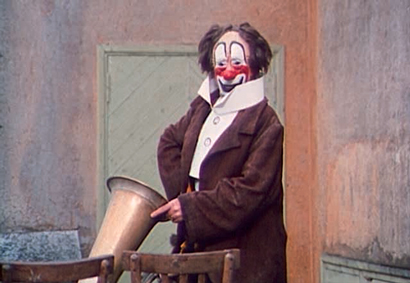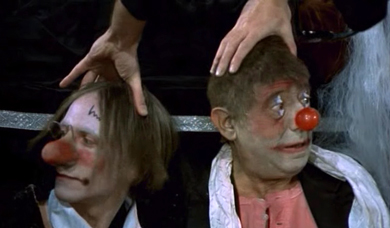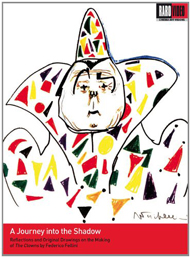
 |
|
|
|
The celebrated Italian film director Federico Fellini made only one full-length theatrical feature between 1965 and 1972, the sprawling, phantasmagoric vision of ancient Rome, Satyricon. He instead directed a fascinating forty-minute episode for 1968's Spirits of the Dead and experimented in television documentaries. Fellini said that TV offered a creative outlet free from the pressure of defending his artistic reputation on the big screen. The success of the NBC-sponsored Fellini: A Director's Notebook (1969) prompted the director to suggest a number of follow-up projects. 
The TV people approved a proposal about circus clowns, a subject that fascinated Fellini. He later wrote, "I feel sympathetic to the circus... the chaos, the music, the monstrous hallucinations, and the death risk that this kind of spectacle, based on wonder, fantasy, mockery, non-sense, fairy-tale and the lack of coldly intellectual meaning was and is, indeed, a spectacle I'm comfortable with." Those words certainly describe Fellini's Satyricon. Circus-like elements dominate several more of his pictures. His 1970 TV production The Clowns (I Clowns) fits right in with Federico Fellini's self-analysis filmmaking method, except that in this case he's examining one his major sources of inspiration. In his extended essay (included with RaroVideo's disc), Fellini has no problem defining his own nostalgic fascination with the circus. He believes that its animal smells, gaudy entertainments and strange promise of danger and death is a holdover from the Circus Maximus of ancient Rome. Taking advantage of the informal creative environment of TV, the director builds The Clowns on several levels at once. He begins by expressing his boyhood wonder at the circus, which he remembers as a magical "pirate" organization that seemed to steal into town under cover of night. He then assembles an on-camera shooting team that "plays" his film crew on the movie. They interview retired once-famous clowns and visit the sites of circuses housed in permanent buildings. The crewmembers and Fellini sit down with the owners of one circus to eat a large meal. At another juncture the film crew arrives to interview yet another famous clown. When too many of them pile out of the car, we see that Fellini is indulging a "clown car" joke. 
Brief but touching interviews show the retired clowns resting in their apartments, enumerating the characters they invented and famous acts they introduced. One gentleman recalls the good times he had with his fellow performers, many of whom were family members; vintage scrapbooks are always lovingly presented. One very serious ex- circus impresario proudly announces his intention to make a major comeback, even though he's a very frail 92 years old. The fact that some of the "documentary" scenes at the actual French Cirque d'Hiver are semi-scripted is not a problem in Fellini's approach, which interweaves conventional docu material, restaged scenes and completely artificial content. Some of the original voices have been replaced in the post-dubbing. When La dolce vita star Anita Ekberg makes a cameo entrance, mostly to pose with some tigers, it's just Fellini indulging a "here she is, why not?" improvisation. Some of the show's extended performance sequences seem to take place before real circus patrons while others appear to be filmed under controlled conditions with an audience of extras. We marvel at Danilo Donati's costumes and the endless variety of clown characters and makeup. We are also treated to plenty of high-class clown action. Comedy teams bop each other with outsized prop hammers, and one funny routine involves clowns spitting at each other with an apparently unlimited supply of water. Some of the clown acts are preceded by more general circus action. Performers in a danger-oriented circus act recite the same rote speeches spoken by Anthony Quinn's strongman in La Strada. An elaborate final performance would suffice as a scene from a fictitious Fellini movie. It's an extended "death of a clown" act -- cue numerous clowns shedding exaggerated waterworks tears -- that becomes a full-on mock funeral. The ending comes with a dignified "White Clown" playing a sad trumpet in the empty bleachers. Fellini definitely wants to remind us of the passing of an art form. We remember the retired performers concerned that audiences have changed, or have forgotten how to laugh; one clown interviewed is distraught that there is no school where new clowns can be taught the old traditions. Fellini's audience doesn't need to be reminded that the decline of the circus is due to easy public access to other entertainment alternatives. By 1970, TV is changing film-going habits as well. The circus just doesn't seem so exotic any more. 
In keeping with the "scrapbook" format Fellini is occasionally seen making arrangements in his office, accompanying his amusing film crew and even directing parts of the show. We've always been told that the director has a sense of humor about himself, and one funny moment confirms that statement: just as Fellini prepares to answer a journalist's question about the deep meaning of the film he is making, both men are hit with clown buckets that cover their heads, right on cue. The Clowns shows Federico Fellini indulging a creative spree, away from the judgment of film history. RaroVideo's DVD of The Clowns is a good transfer of the full-frame original format TV production. We're told that it played Italian TV before being released there theatrically. As can be expected, the color is better in the professionally lit performance scenes. Ruggiero Mastroianni's lively editing adjusts well to the requirements of the small screen. Nino Rota's memorable main theme is familiar from Fellini music compilations. Scattered throughout the show is circus music sourced from Wagner and Bizet, along with the romantic standards Fascination and Ebb Tide. The extras are equal in quality to those found on discs by Kino and Criterion. The original featurette Fellini's Circus is a thorough making-of piece by film historian Adriano Aprá. It examines The Clowns in terms of its relationship to the real circus and to the vein of circus-like content in Fellini's previous films. 
Matrimonial Agency is an excellent transfer of Fellini's 16-minute segment from L'amore in Città, a 1953 omnibus film. Not knowing what kind of woman to expect, a young man asks to be paired up by a marriage service. Of course, the pleasant woman he meets is not a romantic illusion, but a person looking to solve complicated problems through an advantageous marriage. An attractively designed color booklet contains A Journey into the Shadow, a group of Fellini essays on The Clowns, illustrated with photos and some of his own sketches and cartoons. Fellini clearly knows a great deal about the circus and communicates his enthusiasm and affection for its traditions. Clowns are objects of ridicule but they also ridicule their audience ... they're crazy mirrors of the human character. His introduction to the classic European clown types comes with some interesting psychological observations. Fellini's discussion of the differences between "White Clowns" and "Agustos" is fascinating. White Clowns, like the French character Pierrot, are elegant and opinionated, charming and sometimes ghost-like. The more earthy Agustos are bawdy drunkards and sub-working class fools. Fellini describes his own film characters Gelsomina and Cabiria as Agustos, and then proceeds to sort various Italian directors and political personalities between the two categories -- "Pasolini is a White Clown of the graceful and educated type, while Antonioni is one of those quite, silent, sad Agustos."
On a scale of Excellent, Good, Fair, and Poor,
The Clowns rates:
Footnotes: 1. Do you like clowns? David Cairns' 2001 short film Cry for Bobo, viewable on YouTube, is a real treat.
Reviews on the Savant main site have additional credits information and are often updated and annotated with reader input and graphics. Also, don't forget the 2010 Savant Wish List. T'was Ever Thus.
Review Staff | About DVD Talk | Newsletter Subscribe | Join DVD Talk Forum |
| ||||||||||||||||||